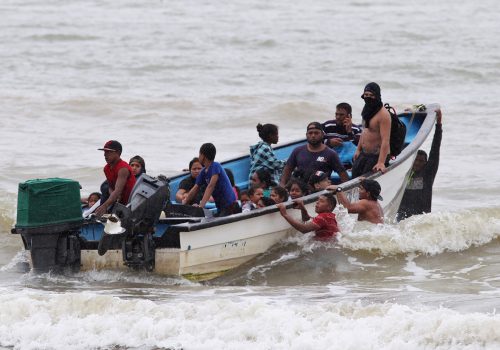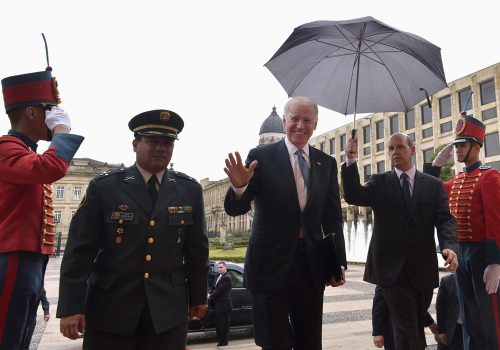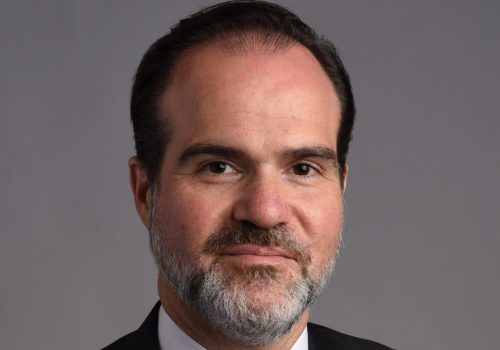FAST THINKING: The next stage of Venezuela’s power struggle
GET UP TO SPEED
Two years ago, the Trump administration recognized opposition figure Juan Guaidó as Venezuela’s interim president and mobilized nations around the world to do the same. But Nicolás Maduro is still in power—and perhaps even more entrenched after winning control this weekend of the National Assembly in an election boycotted by Guaidó and his allies. What does the election mean for the opposition’s future? And will the Biden administration have Guaidó’s back?
TODAY’S EXPERT REACTION COURTESY OF
- Jason Marczak (@jmarczak): Director of the Adrienne Arsht Latin America Center
- Diego Area (@DiegoArea): Associate director and Venezuela lead at the Adrienne Arsht Latin America Center
What’s next for Venezuela?
- Jason points out that the opposition’s calls to boycott Sunday’s vote were effective—the Maduro government’s own estimate put participation at around 30 percent. “More people waited to get food and medicine yesterday than to vote in an election swiftly condemned as fraudulent by the world’s major democracies,” he says, calling the low turnout “a clear signal” that Venezuelans believe “the last vestiges of democratic processes do not exist in the country.”
- The new National Assembly, now controlled by Maduro, will convene in a month. But it won’t be recognized by the nearly 60 countries that consider Guaidó Venezuela’s legitimate leader, Jason says. (Guaidó became the assembly’s president in January 2019.) He expects the opposition to reorganize into a new political structure supported by the United States and its allies.
- Inside Venezuela, Jason tells us, Guaidó might find himself unburdened by the result. “It will mean that the opposition will again have the characteristics of just being an opposition movement without having to present itself as a governing body as well,” he says.
- But this would also strip opposition members of their official positions and thus leave them exposed: “Practically, it will also make it easier for Maduro to arrest them.”
Is Guaidó still viable as an alternative to Maduro?
- Not much has changed in Venezuela’s power structure since the Trump administration backed Guaidó. Maduro, Jason notes, “saw no need to provide any legitimacy to this election or to open any democratic spaces. Sanctions have not produced the desired change in behavior.”
- Guaidó, Jason observes, might be recognized by many countries as Venezuela’s leader, but his power is limited at home. “He can help to mobilize internally but needs more tools and resources to have real sway.”
- Diego, who worked as a campaign manager in the last National Assembly elections before being forced to leave the country in 2016, points out that the legislature had been “the only remaining legitimate institution in Venezuela” under Guaidó.
- Between his international support and backing from most opposition parties, Diego adds, Guaidó has kept his position as an alternative to Maduro. “But that support will not last forever.” With elections for governors and mayors in Venezuela scheduled for next year, he says, Guaidó and the opposition must “find a new path to legitimacy by connecting with the needs of the Venezuelan people.”
- That presents a chance for Guaidó to reinvent himself, Diego says. He can center his efforts on supporting a range of Venezuelan pro-democracy forces exerting pressure on Maduro: “human-rights defenders, independent journalists, union leaders, women’s groups, and civil-society organizations.”
What will Venezuela policy look like under Biden?
- Under Biden, Jason tells us, Guaidó will continue to be recognized by the US “as the legitimate leader of the coalition of opposition forces,” even if that’s in a new role rather than as president of the National Assembly.
- Some concrete steps he expects to see from the new administration: a re-evaluation of the current sanctions regime, greater coordination with Europe, and more focus on getting humanitarian assistance to Venezuelans without propping up Maduro.
- The Biden administration, Jason says, will “take a more comprehensive, nuanced approach to resolution of the crisis with a recognition that sanctions are only one tool in a broader policy to provide international support for Venezuela’s democratic forces.”
Further reading
Fri, Dec 4, 2020
Boats over troubled waters: Caribbean nations struggle with response to Venezuelan migration crisis
New Atlanticist By
Given the small territory and population size of these island nations, the flow of migrants is disproportionately impacting their societies, and it is testing the weight of their institutions and resources, while also enhancing domestic issues like inequality and poverty.
Wed, Nov 25, 2020
What a Biden presidency means for US-Colombia relations
New Atlanticist By
On repeated occasions, President-elect Biden has characterized Colombia as the “keystone” of US foreign policy toward Latin America and the Caribbean, maintaining that, if elected president, restoring the alliance between the United States and Colombia will be among his top foreign policy priorities.
Tue, Nov 24, 2020
IDB President Mauricio Claver-Carone: Latin America wants greater US involvement and consensus
New Atlanticist By
Mauricio Claver-Carone, the first US citizen to lead the Inter-American Development Bank (IDB) in its sixty-one-year history, highlighted the importance of additional IDB assistance for Latin America and the Caribbean as the region confronts the enormous challenges posed by the COVID-19 pandemic and its resulting economic upheaval, with US support central to this cause.
Image: REUTERS/Manaure Quintero


